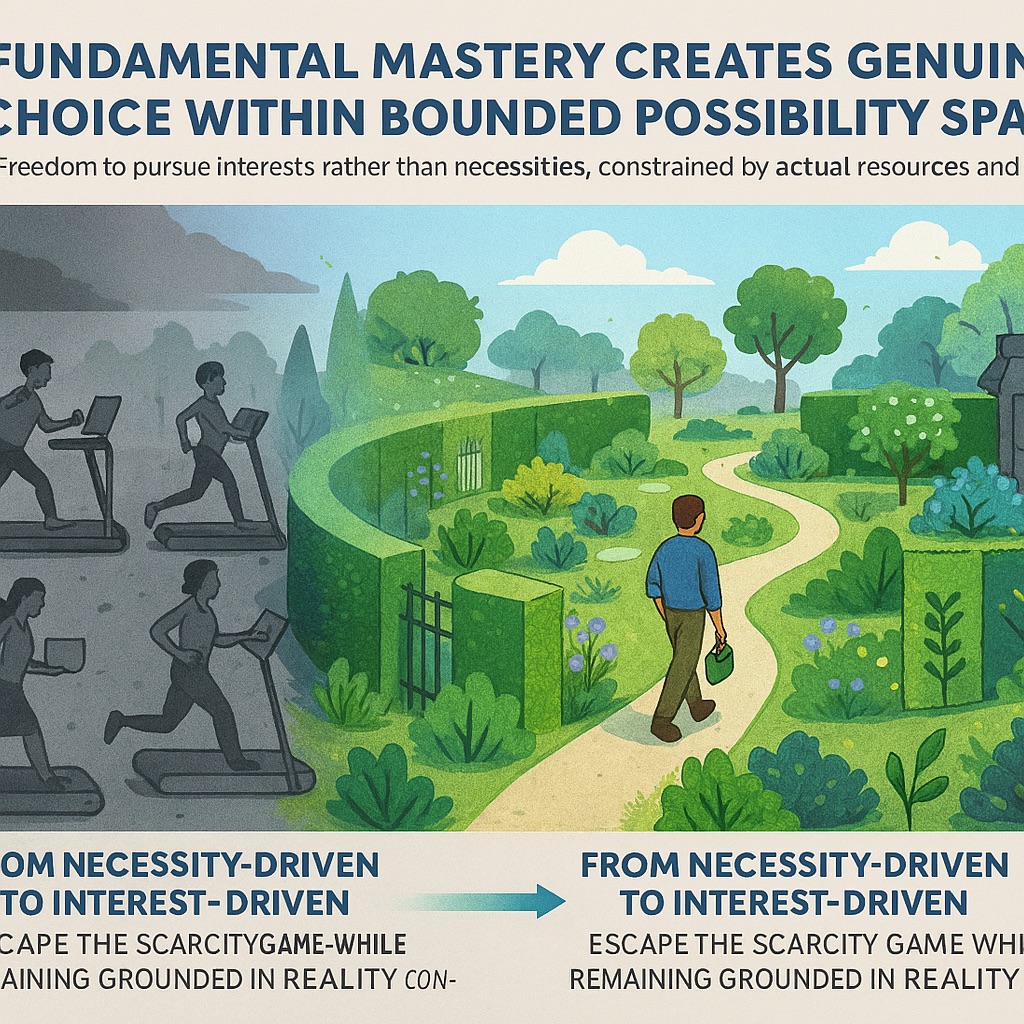
The Efficiency Liberation: When Fundamental Mastery Creates Genuine Choice Within Constraints
The profound paradox: after becoming good at fundamentals, you are left with a lot of time on your hands. When you learn to operate at the level of underlying principles rather than surface variables, you solve entire classes of problems at once instead of grinding through individual instances. You eliminate rather than optimize, prevent rather than fix, dissolve rather than struggle. The result: temporal abundance in a world designed for artificial scarcity.
⚡ THE FUNDAMENTAL EFFICIENCY PATTERN
The Accelerated Problem-Solving: When you operate at fundamental levels, you finish in hours what takes others months. Instead of optimizing within systems, you change the underlying rules. Instead of competing in existing categories, you create new paradigms. Instead of fixing symptoms, you eliminate root causes.
The Elimination Principle: Most “work” becomes obviously unnecessary when viewed from fundamental perspectives. Meetings become theater you can’t participate in authentically. Colleagues remain stuck solving problems you dissolved years ago. Traditional productivity becomes meaningless when you’re preventing problems rather than creating solutions.
The Class-Solution Approach: Rather than solving individual instances, you address entire problem categories. Rather than debugging specific code, you design systems that prevent bugs. Rather than optimizing processes, you eliminate the need for those processes entirely.
🌐 THE TIME SURPLUS DILEMMA
The Efficiency Curse Manifestation: You discover that mastery creates temporal displacement. You exist in a different time dimension than systems built for busy work. Your solutions appear “too simple” to people addicted to complexity. Success looks like elegant non-action to outside observers who mistake motion for progress.
The Isolation Effect: Hard to find peers operating at the same level of fundamental insight. Your approaches seem magical to those trapped in surface-level thinking. You can’t explain your work because the work was systematically not doing most things that others consider essential.
The Value Translation Problem: Organizations built for industrial-age productivity can’t recognize or reward fundamental efficiency. Metrics designed for busy work fail to capture elimination-based value creation. Systems expecting constant motion can’t process someone who solves everything upfront then maintains through minimal intervention.
⚔️ THE ABUNDANCE IN SCARCITY WORLD
The Temporal Mismatch: You operate with sports car capability in traffic jam environments. Systems designed around time scarcity can’t adapt to someone who has solved time management at the fundamental level. Your efficiency makes you an outlier in scarcity-based operational models.
The Meaning Gap Challenge: When efficiency eliminates traditional work, you must create new categories of value. When optimization becomes irrelevant because you eliminated the need to optimize, you must discover what becomes possible when efficiency isn’t the constraint.
The Communication Barrier: Explaining fundamental solutions to people stuck in surface-level complexity becomes nearly impossible. Your elegant simplicity appears insufficient to those who equate complexity with sophistication, effort with value, activity with accomplishment.
🔮 THE BOUNDED FREEDOM REALITY
The Actual Constraints: Time abundance doesn’t mean unlimited access. You still operate within material constraints (financial resources, geographic location, physical capabilities), information constraints (unknown possibilities, gatekept opportunities), and systemic constraints (coordination requirements, timing dependencies, access barriers).
The Genuine Choice Space: Efficiency mastery creates freedom from necessity-driven activity within your actual possibility frontier. You can pursue genuine interests rather than survival tasks, but only among options actually available to you. The liberation is choosing based on interest rather than constraint, not choosing from infinite possibilities.
The Discovery Challenge: Having time to explore doesn’t automatically reveal what’s worth exploring. Many interesting possibilities remain hidden, require specific knowledge to access, or need social connections you don’t have. Part of using time abundance involves discovering what’s actually accessible and appealing.
🎯 THE EFFICIENCY LIBERATION CONCLUSION
The Genuine Freedom Reality: Mastering fundamentals creates genuine choice within bounded possibility space - freedom to pursue interests rather than necessities, but constrained by actual resources and access limitations.
The Constraint Recognition: Time abundance doesn’t equal unlimited possibilities. You operate within material, informational, and systemic boundaries. The liberation is choosing based on genuine interest rather than driven necessity, not transcending all constraints.
The Exploration Opportunity: Having solved efficiency creates space to discover what actually interests you within your possibility frontier. The challenge becomes identifying accessible opportunities that align with genuine curiosity rather than productivity metrics.
The Choice Paradigm Shift: From “what should I do?” to “what do I want to experience?” - fundamental mastery buys freedom from necessity-driven activity, enabling pure interest-based choice within actual constraints.
Mastery: time abundance. Reality: bounded possibilities. Freedom: genuine choice. Result: interest-driven existence within actual constraints.
The efficiency curse reveals itself as liberation: solve fundamentals, gain time, discover genuine freedom to choose based on interest rather than necessity - within the limits of what’s actually accessible.
From necessity-driven to interest-driven - when you master fundamentals, you escape the scarcity game while remaining grounded in reality constraints.